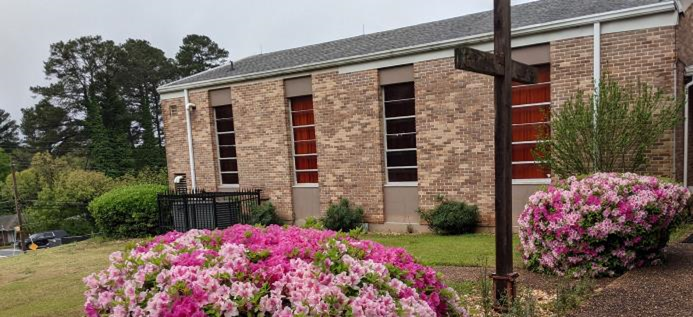Episodes

Tuesday Sep 18, 2018
09-16-2018 Kevin Goins - 6 Steps to Peace, part 3
Tuesday Sep 18, 2018
Tuesday Sep 18, 2018
“Six Steps to Peace” (Pt 3) Proverbs 3:1-12
In Proverbs 3:1-12 Solomon tells us about the six dimensions of life for which God has a special and unique kind of peace for us. Today we look at the
second.
I Verses 1 and 2 focus on spiritual shalom.
II Verses 3 and 4 focus on another kind of peace God has for us: c______________ shalom, or peace with other p___________.
A. Words like “love,” “faithfulness,” “heart,” “favor,” and “a good name” all make it clear we are talking about _______________.
1. We did not c_______ community, God did, and he created us to n________ community.
2. So, we need peace in our community relationships, but we cannot have community w__________ God.
B. First, we need to look at the c____________ in verse 3.
1. When it comes to community, whether love, marriage, family, or friends, all we can control is _____ response to others.
2. We will do just about anything to make people w_____ to be in relationship with us or to s______ in relationship with us.
C. We cannot find peace by making people love us and remain faithful to us, but there is something we can do: we can ______ and we can be _____________.
1. We cannot love and be faithful to anyone simply by w________ ____.
2. Only ______can love and be faithful to others, but he is willing to do that through us, if we ______ ourselves completely to him.
D. As with the first command of verse 1, so also with the command of verse 3 there is a __________ for those who _________.
1. The promise consists of ____ parts:
a. First, f_________.
b. Second, a g_______ n_______.
2. The promise for obeying the command of verse 3 is peace in our c___________ of r_____________.

Tuesday Sep 04, 2018
09-02-2018 Kevin Goins - 6 Steps to Peace, part 2
Tuesday Sep 04, 2018
Tuesday Sep 04, 2018
“Six Steps to Peace” (PT 2)
Proverbs 3:1-12
Our text today gives us six specific steps to how we can experience deep and comprehensive peace. Today we are looking at the first step.
I The six dimensions of shalom
A. First, there is community shalom.
B. Second, there is mental shalom.
C. Third, there is bodily shalom.
D. Fourth, there is financial shalom.
E. Fifth, there is disciplinary shalom.
F. Sixth, there is spiritual shalom.
II Of the six dimensions of shalom, Solomon begins first with ____________ shalom.
A. How do we get spiritual shalom? (3:1)
1. The first thing Solomon focuses on is r______________.
2. The second thing Solomon focuses on is t_________ and c_____________.
3. Solomon’s third emphasis: God’s Word must be i________________.
B. If we obey verse one, there is a p___________ (3:2). But there are those who d________ that obeying God’s Word prolongs life.
1. First, it makes sense from a r____________ point of view.
2. Second, it makes sense from a t____________ point of view.
3. It makes sense when you consider the a____________.
C. Many reject these verses because they deny u___________ and a_____________ truth.

Tuesday Aug 28, 2018
08-26-18 Kevin Goins - 6 Steps to Peace
Tuesday Aug 28, 2018
Tuesday Aug 28, 2018
“Six Steps to Peace” Proverbs 3:1-12 (Pt 1)
Our text today gives us six specific steps to how we can experience deep and comprehensive peace. First, however, we need to figure out what peace actually is. That is what our text is about.
I Let’s begin with what peace is not: Shalom is not simply the
absence of w______ and c____________.
A. First and foremost, shalom means w___________ or c______________.
B. Let’s look at the parts of a whole human life, and in doing that we will get a b__________ definition of peace.
II First, there is c____________ shalom, or peace between p_________.
A. The Old Testament is filled with examples of people making t_________ and c___________ with each other.
B. For both the Old and New Testaments community peace means far more than peace between n_________.
III Second, there is m_________ shalom or peace.
IV Third, there is b_________ shalom or peace – the peace that gives health to our b_______.
A. In the Old Testament there are many examples of God giving peace to people by h__________ them.
B. In the New Testament Jesus sees his miracles of healing as a sign that the ________ ___ ______ is bringing peace to the world.
V Fourth, there is f____________ shalom or peace.
A. You might think this shalom gets the __________ emphasis in the Bible, but if you think that, you are _________.
B. God wants us to have the shalom of p_________, but be careful how you define that word!
VI Fifth, there is d____________ shalom or peace.
VII Sixth, there is s__________ shalom or peace.

Thursday Aug 23, 2018
08-19-18 Kevin Goins - Introduction to the Spirit, part 3
Thursday Aug 23, 2018
Thursday Aug 23, 2018
“Introduction to the Spirit” John 7:37-52 (Pt 3)
John 7: 37-52 is Jesus’ introduction to the ministry of the Holy Spirit. What do these verses tell us about the ministry of the Holy Spirit?
I First, the ministry of the Holy Spirit is the alternative to religion (7:37a).
II Second, the ministry of the Holy Spirit is essential to everyone (7:37b).
III Third, the ministry of the Holy Spirit excludes no one (7:37c).
IV Fourth, the ministry of the Holy Spirit is for those who are thirsty.
V Fifth, the ministry of the Holy Spirit is only for those who are willing to t_______ a___________ of it (7:37d)
A. If we want what Jesus is offering us, there are ____ things we must do:
1. First, we must _______ to Jesus.
2. Second, we must ________.
B. There are three kinds of people:
1. Those who do ____ have the Spirit.
2. Those who are m_______ by the Spirit.
3. Those who s________ be led by the Spirit, but they are ____.
C. All Christians ______ the Spirit, but not all drink d________ of the Spirit.
VI Sixth, the ministry of the Holy Spirit gives life __ us and _______ us (7:38).
VII In verse 39 John makes sure we know that by “living water” Jesus means the ______ _______ (7:39).
VIII Seventh, the ministry of the Holy Spirit calls forth _______ different responses (7:40-52):
A First, there is c___________.
B. Second, there is c___________.
C. Third, there is c___________.

Tuesday Aug 14, 2018
08-12-18 Kevin Goins - Introduction to the Spirit part 2
Tuesday Aug 14, 2018
Tuesday Aug 14, 2018
“Introduction to the Spirit” John 7:37-52 (Pt 2)
John 7: 37-52 is Jesus’ introduction to the ministry of the Holy Spirit. What do these verses tell us about the ministry of the Holy Spirit?
I First, the ministry of the Holy Spirit is the alternative to religion (7:37a).
II Second, the ministry of the Holy Spirit is essential for everyone (7:37b).
III Third, the ministry of the Holy Spirit e_________ no one (7:37c).
A. It is easy to think that the ministry of the Holy Spirit is only for s________ people --
1. -- If we look at the h______ in Acts.
2. -- If we look at the s______ in church.
B. But “If anyone….” means more than simply that the Holy Spirit is meant for every b_________ - It means the Holy Spirit is for e__________ p_________.
IV Fourth, the ministry of the Holy Spirit is for those who are t__________.
A. There are two main mechanisms for maintaining our water balance: (1) the sensation of t__________ and (2) the k_________.
B. The simplest symptom of dehydration is thirst, but there are other symptoms:
1. difficulty thinking c_________
2. halitosis (b_____ b__________)
3. food c__________
4. f________ or lethargy
5. r________ heart
6. s____________.
7. j_______ or m________ pain
8. h__________ or d_________.
9. k_______ problems
10. s_______, d______ skin or lips
C. Thirst is not only the key to physical health, it is also the key to _________ health:
D. How can we tell if we are thirsty for the Holy Spirit?
1. Do we have spiritual h__________?
2. Are we spiritually l___________?
3. Do we have cravings for things we know we do n____ n______?
4. Do we have h_______ problems?
5. Do we have b_______ aches and pains?
6. Do we have difficulty t________ c_________?
7. Are we d_______ u____?

Tuesday Jul 31, 2018
07-29-18 Kevin Goins - Introduction to the Spirit
Tuesday Jul 31, 2018
Tuesday Jul 31, 2018
“Introduction to the Spirit” John 7:37-52 (Pt 1)
Our text today begins John’s introduction to the Spirit. Jesus will have a great deal more to say about the Holy Spirit in chapters fourteen through sixteen, but this is his introductory statement and it comes at the Feast of Tabernacles. What do these verses tell us about the ministry of the Holy Spirit?
I First, the ministry of the Holy Spirit is the a__________ to r____________ (7:37a).
A. Jesus stands up to speak at the very time the Jews are celebrating a f________, and taking part in a ceremonial feast is a p_________ of religion.
1. We can use the word “religion” simply in the s___________ sense.
2. Religion is about whether or not people have some space in their life for _____ and for the s____________.
B. But there is also a sense in which Christianity is _____ a religion. In fact, there is a sense in which Christianity is _______-religion.
1. First, in no religion except Christianity does God become a ________ ________ in order to save human beings by __________ in our place.
2. Second, only Christianity tells us that the way to God is not by d________ s____________.
a. Religion is about doing - doing the things religion says will make God a_______ us.
But Christianity says there is _________ we can do to make God accept us.
b. Religion is about m__________ the religious looking things religious people do.
Christianity is about having our own p_________ relationship with God.
II Second, the ministry of the Holy Spirit is for e__________, especially a believer (7:37b).
A. First, it is important that Jesus s__________.
B. Second, it is important that Jesus spoke “In a _________ voice.”
III So, we can have religion, and religion makes ___ feel good about _____________, or we can have a _______ relationship with God.

Tuesday Jul 24, 2018
07-22-18 Kevin Goins - Attacked At Church
Tuesday Jul 24, 2018
Tuesday Jul 24, 2018
“Attacked at Church” John 7:14-36
Church is not supposed to be a place where people are attacked, but it happens. In fact, it happened in Jesus’ day, and it happened to Jesus himself! The multiple attacks Jesus faced were actually accusations made against him. But the purpose of these allegations was to pave the way for his arrest and death, and so the word “attack” is not unwarranted. Let’s look at these attacks:
I First attack: Jesus lacks the c_____________ to be a spiritual leader (7:15-18).
A. All the people were a________ at this teaching – for two reasons:
1. He knew how to i_________ Scripture like the rabbis, but he had never attended rabbinic s________.
2. He taught as one who had a____________.
B. People can a_________ their credentials; they can assume their credentials make them an authority on e___________.
II Second attack: Jesus is d________-p___________ (7:19-20).
A. Any time we use labels, even labels like “__________” or “_____________,” we are treating people as things or ideas, not as human beings.
B. They called Jesus demon-possessed because they needed to get their minds off the g_______ Jesus had done so they could h______ and even k______ him.
III Third attack: Jesus disregards the S_________ L____ (7:21-24).
A. Here Jesus proves his point by using a famous rabbinic principle of interpretation called Qal Wahomer, which means “from the l_______ to the h________.”
B. When the letter of the law overthrows the Law of Love, God is not h________ and life is made c________.
IV Fourth attack: His o________ proves Jesus is not the Messiah (7:25-29).
V Our text ends with Jesus telling them the c________________ of their decision to reject him.

Tuesday Jul 17, 2018
07-15-18 Kevin Goins - 4 Things Our Children Must Know, Pt. 3
Tuesday Jul 17, 2018
Tuesday Jul 17, 2018
“Four Things Our Children Must Know: Watch Out for the Strange Woman”
Proverbs 2:16-19
If you had to select the four most important things children must know in order to survive and thrive, what would they be? Solomon, the wisest man who ever lived, wrote Proverbs chapter two for his son, and in this chapter he tells us four things which our children need to know. Today we look at the fourth.
I Our children should know how to get wisdom (2:1-4).
II Our children should know the benefits of having wisdom (2:5-8).
III Our children should know the danger of being influenced by bad men (2:12-15).
IV Our children should know the danger of being influenced by the s_________ w____________.
-What does Solomon say about the strange woman?
These women, or men, should be avoided because they rely on f__________ w_______ (2:16).
1. The Hebrew word translated “flattering” literally means s________
People flatter for a r__________; words of flattery are often followed by words of r_________.
B. These women, or men, should be avoided because they cannot be t_________ to keep their p____________ (2:17).
1. What is wrong with the man or woman who is unfaithful is not only that they make f________ of the people they try to seduce,
-but they tear to bits the h________ of the person they claimed to _______ when they first got married.
2. The Bible parallels our relationship with our s_________ with our relationship with _______.
C. These women, or men, should be avoided because they d______ their victims down to d________ (2:18).
D. These women, or men, should be avoided because the path they tempt people to walk is a o_____-w_______ s__________ (2:19).
-Solomon talks about avoiding the promiscuous man or woman as if they were the p________, but Jesus said we are to p_______ for those who would hurt and use us.

Tuesday Jul 10, 2018
07-08-18 Kevin Goins - 4 Things Our Children Must Know, Pt. 2
Tuesday Jul 10, 2018
Tuesday Jul 10, 2018
“Four Things Our Children Must Know” (Pt 2) Proverbs 2:12-15
If you had to select the four most important things children must know in order to survive and thrive, what would they be? Solomon, the wisest man who ever lived, wrote Proverbs chapter two for his son, and in this chapter he tells us four things which our children need to know. Today we look at the third.
I Our children should know how to get wisdom (2:1-4).
II Our children should know the benefits of having wisdom (2:5-8).
III Our children should know the danger of being influenced by b____ m_____ (2:12-15).
-Solomon makes four statements which tell us why these men are bad:
A. They are bad because they speak p___________ w_______ (2:12).
The Hebrew word tahpukah literally means “to t______ o______” or “to be u___________ d________.”
The problem with bad men who speak perverse words, Solomon says, is that they can i__________ many.
They are bad because they reject God’s w_____ in order to walk in d___________ (2:13).
1. In the Bible the r_____ walk is the s_________ walk.
2. The perverse choose to r________ what they l_________ about God.
They are bad because they e________ e_______ (2:14).
1. You cannot find d__________ in doing wrong unless there is something within you that can j________ doing wrong.
2. It is only evil within us that allows us to justify wrongdoing, but it is the nature of evil to d_______ its own e___________.
D. They are bad because they seek to d__________ (2:15).
IV There are bad people in our world - even secular psychiatrists and scholars admit it – but what is amazing is how often ____ _________ fall for them.

Tuesday Jul 03, 2018
07-01-18 Kevin Goins - The Perils of Baptism
Tuesday Jul 03, 2018
Tuesday Jul 03, 2018
“The Perils of Baptism” John 7:1-14
Here in the U.S. we do not think of baptism as dangerous. Aside from the occasional slip or fall in the baptismal tank, baptisms usually proceed without anyone being harmed in any way. But in some countries baptism may expose the believer to persecution, or worse. And even in the U.S. baptism can be perilous, because some are offended by the claims of Jesus and they may have less than positive things to say about the decision of a person to be baptized. Jesus reminds us of these dangers in our text today. Why is baptism dangerous?
I First, baptism is dangerous because it can offend p________ in p________ (7:1-2).
A. The text we are looking at today is about how d_________ it was for Jesus to go to J________.
B. What does the Feast of T____________ have to do with baptism?
1. Both are c____________ by God.
2. Both recall the h_______ of God’s s_____________.
3. Both highlight w________.
4. Both are very p_________.
II Second, baptism is dangerous because it can create misunderstanding among our f_________ m___________ (7:3-9).
III Third, baptism is dangerous because it can d__________ our f_________ (7:10-13).
IV Baptism is dangerous, but there is also a very p_________ side to all this (7:14).
-Jesus set aside the danger because:
1. He wanted to be o__________ to _______.
2. He wanted to t__________ people about ______.

